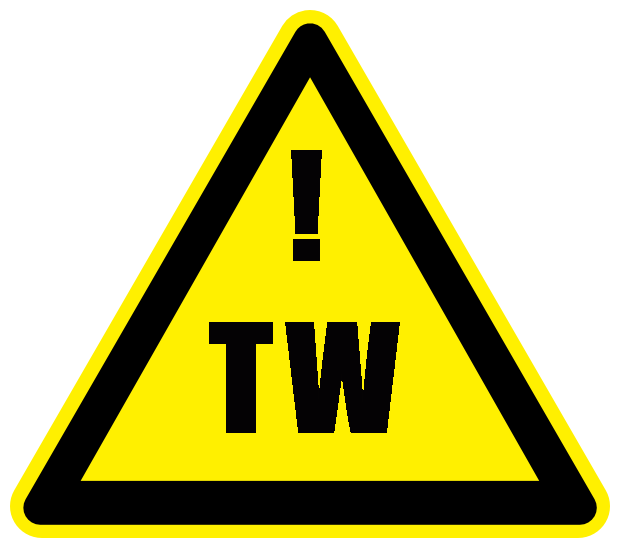
Skepchick has covered trigger warnings before in a variety of ways. It seems to be a catalyst topic to weed out who’s interested in making the world easier and kinder vs. who thinks everyone should be in it for themselves. But despite all this talk I often see people talking in general terms, or saying that they personally don’t find trigger warnings helpful.
Despite reading nearly every article about trigger warnings that comes across my radar, I can’t recall a single article that said “trigger warnings make my life easier.”
So I’d like to offer the perspective of someone who does find trigger warnings exceedingly helpful.
When I see a trigger warning, it’s very rare that I actually avoid the content it labels. I do not find TWs helpful as a way to curate my life into a happy little bubble that doesn’t include anything difficult or upsetting. First, that’s impossible and I spend much of my life dealing with things that are triggering anyway. Second, the point of the TW is ideally to allow people with mental illnesses to participate more fully in difficult discussions.
What IS helpful about TWs is that they let me know what’s coming. When someone talks about weight loss or self harm out of the blue it feels like I’m being smacked. Worse than that, because of the edges of paranoia that come with my depression and anxiety, it feels personal. It always, always, always feels like they’re talking about me or attacking me in some fashion, intentionally bringing up the things that make me feel the worst.
Now I realize that this isn’t rational and it’s something that I am working on fighting on my own terms, but the presence of the TW is enough to give me the space to realize that they want to have a discussion and also that they care about my well being. The TW is what lets me take a second to engage the more rational parts of my mind and lets me be gentle with myself.
In Dialectical Behavior Therapy there’s something called Wise Mind. It’s the balance between emotions and reason. When you’re in Wise Mind, you’re aware of your values and goals, and also capable of paying close attention to the facts at hand. TWs give me the space to try to be in Wise Mind. It’s that moment of mindfulness that makes me pull away from the strong emotional reactions I would have otherwise.
Sometimes when I see a trigger warning I choose to continue reading but I’m highly aware that if I need to close the window or go away for a while. that’s ok. It puts me in the mindset of self care rather than my typical mindset that sees disengaging as a failure.
Trigger warnings very rarely tell me that I should opt out of a conversation. Instead, they tell me that I’ll be safe if I try to engage. To some extent they’re a signaling mechanism that lets me know people care about my mental well being. But more than that they’re a reminder to me that I should be considering my mental health and engaging the skills that I have. And it gives me a heads up of what skills I’ll need to use based on what kinds of content will be there. If it’s weight related, I just skip all numbers. If it’s self harm related, I usually engage some kind of anxiety relief or self soothing (with a fidget or game).
When I don’t have the warning it hits suddenly and I don’t have coping skills at hand. It’s easy to get overwhelmed. It’s easy to let myself slip quickly into an anxiety attack, or even to use symptoms. TWs help me protect myself.
So when I see a TW, I feel safer. I know that I am safer because I take a minute to check in with myself and prepare for what might be coming. And I’ve found that I am almost never full on triggered by something that I’ve had warning for. It makes my life much easier and more than that it saves me from a lot of pain. Serious, real pain. That’s why trigger warnings are helpful to me.
Cross posted with edits from We Got So Far To Go.





I don’t believe I’ve ever come across a single example of anyone with PTSD , or any other condition that may benefit from trigger warnings, actually use the trigger warning as an excuse to avoid the subject or content.
On the other hand, I routinely see people with no known PTSD/AD or similar habitually avoid anything with ‘invisible trigger warnings’ like : “Director: Michael Bay”, “Starring: Mark Wahlberg/Ben Stiller”, “The most exploserous movie of the year”, “This years best Romantic Comedy”, all to complete social acceptance of that behaviour.
It’s utterly baffling that people can completly avoid things they merely dislike and we call it consumer choice and pretend it’s totally normal, but people asking for a heads up on things that may literally make them ill are lied about, lied to, and generally made fun of.
Consider it Something Else Social Media Have Ruined. (I have a certain loathing for social media slacktivists, you may have noticed.) The problem, I think, is the overuse of the term ‘triggered’ to mean ‘disturbed’ rather than ‘forced back into some traumatic event in my past’. Call it an appropriation, if you will.